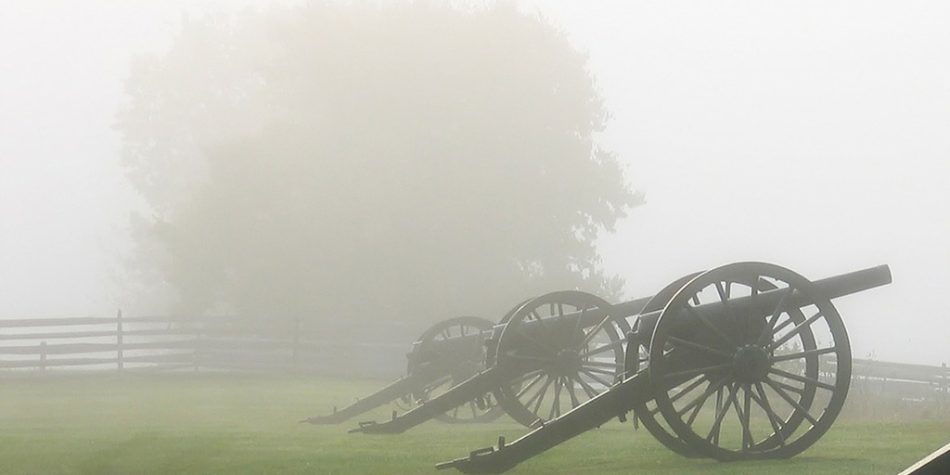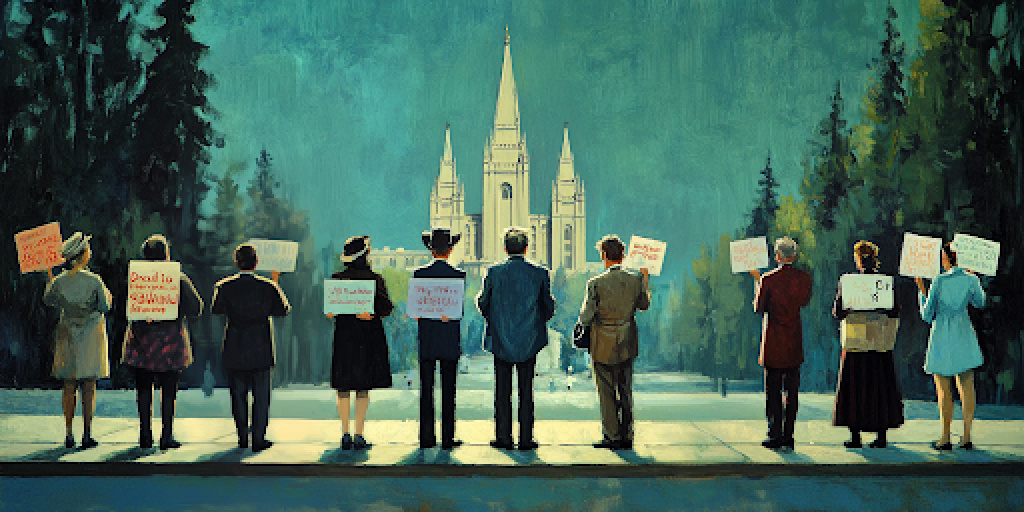“It’s time to put away the harsh rhetoric. To lower the temperature. To see each other again. To listen to each other again. To make progress, we must stop treating our opponents as our enemy. We are not enemies. We are Americans.” —Joe Biden
Lovely rhetoric. Rhetoric isn’t nothing. If America is an idea, not a tribe of “blood and soil” —if we are, as St. Augustine defined a nation, a community “united by the common objects of our love”—then one essential qualification of an American president must be the ability to articulate what those objects are.
And yet: “Watch his hips, not his feet,” as they say in football. “A man can smile, and smile, and be a villain.” Acts contrary to soaring rhetoric mock both the words and their intended targets.
I devoutly want Americans, even when we disagree profoundly, to remember “the mystic chords of memory, stretching from every battlefield and patriot grave to every living heart and hearthstone,” and continue as fellow countrymen. We’ve been through a lot together and accomplished so much. Like Washington, I believe our independence, founding and survival were literally providential—more than we had any right to expect.
Over the years I was supposed to have spent growing up, I’ve wasted way too much time playing “world-builder” computer games, from Sid Meier’s original, addicting “Civilization” to “Europa Universalis.” The temptation to use the Capitol Hill riot as an excuse to double down on post-liberal “cancel culture,” with the object of crushing the Deplorables once and for all, must be resisted.
One of the features of those games, where you rule and develop a civilization, is typically some measure of social cohesion. Ignore enough complaints from your sim-citizens for too long, and bad things happen. Your tax collections fall, or your policing costs rise. Even if the citizens don’t rebel outright, you lose the willing cooperation of people who feel that their government is truly theirs, leaving you with only what compliance you can extract by force.
In a computer game, it doesn’t matter whether you think your sim-citizens’ grievances are morally right or wrong. Let the “cohesion” bar get too red, and you’ve got trouble. You can either assign more resources to suppress unrest, or you can throw the restive sims a bone and remove some of their grievances. At the very least, you avoid antagonizing them even more.
In the immediate aftermath of the 2020 election, commentators expressed outrage that 70 million Americans could have voted for Donald Trump, and asked “what can be done” about them. There was talk of “enemies lists,” and blackballing Trump’s supporters from future employment and polite society. (Apparently the only thing wrong with “McCarthyism” was that it was aimed at the wrong side.)
Enter, stage right, a truckload of gasoline: the January 6 Capitol Hill riot. The President of the United States addressed an agitated mass demonstration, repeated his allegations of election fraud, and invited his supporters to march on the Capitol (“peacefully and patriotically”)—all to encourage a quixotic gambit by a minority of the Republican delegations to delay the electoral certification pending an “audit.”
Unlike past tense demonstrations at the Capitol, the Capitol Police were apparently badly unprepared. Some demonstrators found a lightly-guarded entrance open and entered the building. There were disturbing images of people attempting to break glass to get into the House Chamber itself. Most of the rioters milled around generally making fools of themselves—including the icon of the riot, a half-naked man in a buffalo “shaman” headdress—but by all indications, some seriously intended to physically stop the “corrupt” vote of Congress certifying the election “by any means necessary.” A woman was shot dead by police as she tried to break into the House chamber, and a policeman was fatally struck with a fire extinguisher.
Three others died: a woman trampled to death while carrying (in a darkly ironic touch) a Gadsden “Don’t Tread On Me” flag and two men who died of a heart attack and a stroke, respectively, outside the building.
Afterward, President Trump tweeted (and was promptly and permanently banned by Twitter for) the following: “These are the things and events that happen when a sacred landslide election victory is so unceremoniously & viciously stripped away from great patriots who have been badly & unfairly treated for so long.”
The President was widely accused of “inciting” the violence in the Capitol—indeed, of “sedition” and “inciting insurrection” or attempting a “coup.” Even though his speech said nothing about storming the Capitol, violence, or any other unlawful act, it was argued that his words were a coded message to his supporters. And indeed, his “These are the things … that happen” tweet after the fact, if not an outright endorsement of those “things,” was, as the saying goes, “praising with faint damns.”
In a rapid cascade, the President was banned from every social media from Twitter to Shopify to TikTok. A frantic hunt ensued and is still continuing, for anything with any connection to “treason,” “sedition,” “insurrection,” or other dangerous talk. Whether this escalates to a repeat of the early 1950s “Red Scare” remains to be seen, but early impressions are that it may even surpass that.
Ever since the Vietnam War, the Democratic Party struggled to overcome the trope—fair or not—that they were the “disloyal” faction. January 6 presented them with a golden opportunity to reverse that theme once and for all and hang a scarlet T for Traitor around the opposition’s necks.
Nevertheless: You can lower the temperature and call for unity—or you can talk vengeance. Pick one.
If the former, the uphill climb is already steep enough. Millions of people watched the people now talking about “unity” spend the last four years doing the exact opposite of what they ask now. Having persuaded themselves that Donald Trump presented an unprecedented, extraordinary threat to democracy itself, they acted accordingly. While throwing themselves into massive resistance of his presidency, their hatred of the man inevitably bled over onto his deplorable “scum of the earth” supporters—the people they now insist must “lower the temperature” and join hands in friendship, unity, and concord.
Worse, these same supporters also saw many of those people talking of unity now normalize and rationalize political violence (no less explicitly than Donald Trump has) to an unprecedented degree over the past summer in service of left-wing ends. “People will do what they will do,” as the Speaker of the House, Nancy Pelosi, said of the summer fashion of mobs pulling down “problematic” public statues. A deadly, destructive armed occupation of multiple city blocks was a “summer of love”: “Don’t be so afraid of democracy,” the local leftist mayor smugly dismissed concerns. (She changed her tune when her own house was surrounded, and the occupiers’ security forces shot two black children, one fatally.)
So invested were left-liberals in the dogma of political violence to promote “social justice,” that the brilliant young Democratic political analyst David Shor was canceled—hounded by a Twitter mob, and fired by the consulting firm where he worked—for Tweeting an academic study showing that the violent riots of the late 1960s were politically damaging to Democrats.
Some might dismiss the above as “whataboutism,” a word more often deployed than clearly defined. Indeed, left-wing riots do not excuse right-wing riots. But a system is not sustainable when one faction reserves the right to resort to the knife and torch while insisting the other stick with the ballot box and what’s left of the soapbox after “cancel culture” took a hatchet to it.
I agree: “We must not be enemies.” The costs of that would be horrific. But understand: This is a big ask. Asking one’s opponents to be better than they were—while still reserving the right to call them trash—is not likely to work.
Maybe progressives are ultimately right about their enemies. Either way, though, if they really believe their own rhetoric—if they truly seek unity, not submission—words alone aren’t going to do it. Especially if other words, and other acts, send other signals.
And even if they’re correct—that left-wing causes are inherently nobler than conservative causes—the fundamental bargain of democracy is that each side must forswear political violence. It’s no good making exceptions for “just causes”—the whole premise of democracy is the recognition that different people disagree about what causes are just.
I believe that liberal democracy is desirable because it is moral—because, among all of the governing arrangements available to human beings in their present condition, government by consent which honors the natural rights of man is the one most consistent with the God-given sovereignty of the human person. But set morality aside for a moment, and focus just on the pragmatic:
In a democracy, we each consent to be governed by the same rules, even though we know sometimes we’ll lose—because the costs of occasionally losing are lower than the high transaction costs of having to hash things out with battle axes every time we disagree.
“Game theory”—the study of strategic interaction between rational decision-makers— makes it clear that if one player resorts to political violence, so will his opponent. No asymmetrical ruleset ever endures long. If the object is to preserve a liberal democracy, then it doesn’t matter who is right or wrong about whose cause is more just. Since each side will typically think the answer to that question is “my cause, obviously,” the only possible way to restrain both from kicking over the game table is for the commitment against “politics as war” to be universal.
And that brings us to the Deplorables’ talk about stolen elections, and how to respond to it.
If someone is honest about wanting to “see each other again … listen to each other again,” he needs to step back, take a deep breath, and put himself in the other side’s shoes.
With open accusations of decisive voter fraud, a refusal to concede, and explicit lobbying of legislators to resort to extraordinary (if legal) measures to prevent his reelection from being “stolen,” President Trump set a new precedent for a defeated candidate’s willingness to play with fire. There have been Presidents who believed they were cheated—notably, Richard Nixon in 1960. Nixon, however, balancing the difficulty of proving his suspicions with the potential harm another contested election might do to confidence in the legitimacy of American democracy at the height of the Cold War, chose to concede and let his surrogates sift through the fraud in Chicago and Texas.
Nevertheless, challenges to the legitimacy of elections have increased dramatically over the past three decades. Donald Trump is swinging on the latest sweep of the pendulum.
Those now being accused of “conspiracy theories” for doubting the honesty of the election watched their now-critics reject the “stolen” hung-chad election of 2000, pronouncing George W. Bush “selected, not elected.”
In 2004, they saw conspiracy theories about Diebold voting machines being hacked by nefarious Republican operatives turned into Emmy-nominated documentaries, and Democrats in Congress object to the electoral count. They heard the defeated candidate, John Kerry, declare that “the widespread irregularities make it impossible to know for certain that the outcome reflected the will of the voters.”
They saw 2/3 of Democrats (according to a poll by The Economist magazine) say they believed Russia didn’t just spread disinformation during the 2016 election, but actually tampered with the vote count—something for which there was never any credible evidence.
They saw the Speaker of the House herself declare that the 2016 election had been “hijacked.” They heard former President Jimmy Carter call Donald Trump’s presidency “illegitimate.” They saw calls for the Electoral College to ignore the voters’ will and install Hillary Clinton instead.
That is to say: The last time a Democratic presidential campaign unambiguously accepted the voters’ verdict, Michael Dukakis was riding around in a tank with a funny helmet on, Guns & Roses was fresh, and your humble correspondent was wearing ridiculous fluorescent orange volleyball shorts.
And now, millions of Americans are hearing themselves accused of “undermining faith in democracy” because they perceive things about the 2020 election—statistical improbabilities, “computer glitches,” unusually high turnouts in key precincts, sudden surges of Biden votes—they think look fishy.
Now, there may be innocent explanations for each quirk. Rumors have been refuted, and apparent oddities have been accounted for. Legal challenges have gone nowhere—some for technical reasons, others on the merits of the evidence and pleadings offered. Although this election broke multiple historical patterns, it’s entirely possible that the unique circumstances of this election—with Donald Trump as an unusually polarizing, political-coalition-shifting figure, and a massive increase in mail-in voting as a Covid-19 precaution radically altering the makeup of the electorate—fully explain why old patterns no longer apply. Or these oddities could simply be happenstance. It would be an extraordinary coincidence if there were never any extraordinary coincidences.
That is to say: Fraud is not, borrowing from Sherlock Holmes, something improbable which must nevertheless be true because everything else is impossible.
Yet neither is it true that to suspect fraud automatically makes one the equivalent of the “fire can’t melt steel” crowd who thought George W. Bush personally dynamited the World Trade Center. Nor is it true that courts’ refusal to grant the extraordinary relief of delaying a Presidential election establishes definitively, as a matter of fact (as opposed to law) that fraud cannot possibly have occurred. As far as the law is concerned, what cannot be proven does not exist—but ordinary citizens are not bound, in their opinions, by those limits. (We are personally free to believe O.J. Simpson guilty of killing his wife, or not, regardless of what the jury that tried him for murder found.)
Some years ago, I helped litigate a public corruption case where a Southern California city had unlawfully diverted tens of millions of dollars of developer fees to its own use. The city’s senior management (the city manager, police chief, several department heads) all wound up pleading guilty to felonies. It took more than two years, dozens of depositions, thousands upon thousands of pages of grueling document review, and a top-notch forensic accounting firm. Robert Mueller spent over $40 million and two years investigating “Russian collusion” in the 2016 election. Cheaters don’t do their deceit in daylight, and digging it up takes time.
Progressives now claim to revere the institutions of American law and democracy and profess rage that “faith” in these hallowed institutions is being questioned. And yet they seem to have little faith in those institutions themselves. If the judicial system isn’t capable of seeing off meritless claims without them “steadying the ark” with blacklists, doxxing, harassment, “canceling,” and other vigilante suppression of dissent, after all, how reliable do they really see these institutions as being?
A similar dynamic sometimes operates in the religious context. When skepticism cuts too close to sacred bones, there can be pressure to simply avoid “dangerous” topics. “Do not spread disease germs,” as one concerned churchman once cautioned. “Some things are true that are not very useful.”
We must reject that doomed approach. Obscurantism (intentionally preventing people from accessing “dangerous” knowledge) rarely works. For every person from whom you successfully hide unhelpful facts, two people conclude what you’re hiding must be serious. And even if it did work, it would not be worth the price. The foundation for any worthwhile morality must be truth. “If we have the truth,” the namesake of Brigham Young University’s law school declared, “it cannot be harmed by examination. If we have not truth, it ought to be harmed.” Or John Milton: “Let [Truth] and falsehood grapple; who ever knew Truth put to the worse in a free and open encounter?”
Let’s get back to those sim-citizens in the computer game with the “cohesion” bar flashing red.
Whether or not we think widespread election fraud is a serious possibility, if we’re serious about national unity, the worst possible thing would be to make tensions worse. President Trump’s opponents may think their own past claims about “stolen” “hijacked” elections were perfectly reasonable, whereas their opponents’ are dangerous paranoid conspiracy theories. But the other side isn’t likely to be impressed by self-justifying split hairs. If what’s fine for the blue goose isn’t good for the red gander, the gander’s going to squawk.
The perception that leftists can question the fairness of an election, while that is forbidden to their opponents, must be seen in the broader context of what’s been called the Woke Supremacy—the increased ability and willingness of progressives to use their cultural power to suppress competing ideas. Having obtained “fire superiority,” to borrow a military metaphor, over key cultural centers of gravity, today’s postliberal progressives have taken Thucydides’ ruthless Athenians at Melos as their model: “The strong do what they can and the weak suffer what they must.”
The attitude is “We don’t care about your nonsense. We don’t have to care. We have vast majorities of the civil service, the press, academia, and mass entertainment on our side.”
With apologies to Hilaire Belloc: “Whatever happens, we have got / The Cultural Heights, and they have not.”
Trepidation that we are slouching toward a Chinese-style “social credit” system, where dissenters are socially excommunicated and locked out of the mainstream economy, may be overblown—but surely less so than a decade ago, or even two weeks ago. That is the dry tinder into which progressives, with their talk of blacklists and “truth and reconciliation commissions,” are tossing a highway flare.
A friend recently remarked that when American soldiers patrolled occupied Baghdad, in the aftermath of the Second Iraq War, they could always tell when they were passing from a Sunni neighborhood to a Shi’ite one: The poverty level visibly increased. There was no mistaking which faction the regime favored, and whom the regime despised.
America is not supposed to be like that. We are supposed to prosper based on our talents, our drive, and our efforts, not who we are or whether we toe the party line. We have often fallen short of that ideal—but we have rarely outright denied it is the ideal we should strive for. Nor have we usually taken being treated contrary to it lying down.
People who lack the institutional and cultural weapons their opponents wield against them may accept that asymmetry of power—or they may not. Betting that your enemies will fight on the ground of your choosing is always unwise.
The German military theorist Carl von Clausewitz famously maintained that “war is simply a continuation of political intercourse, with the addition of other means.” For most of human history, the reverse has been equally true: Politics is simply the continuation of war, with its more sulfurous means only temporarily suspended. “Punish your enemies; reward your friends.”
What most Americans take for granted—a society where people with even the fiercest disagreements coexist peacefully under the equal rule of law—is not at all the human norm.
In 2017, the rationalist writer Scott Alexander wrote an essay in his “Slate Star Codex” blog entitled “Against Murderism.” In it, he described liberal democracy as a miraculous piece of “alien machinery”:
Liberalism is a technology for preventing civil war. It was forged in the fires of Hell—the horrors of the endless seventeenth-century religious wars. For a hundred years, Europe tore itself apart in some of the most brutal ways imaginable—until finally, from the burning wreckage, we drew forth this amazing piece of alien machinery. A machine that, when tuned just right, let people live together peacefully.
It is indeed an amazing piece of machinery our founders built us, and their children and our grandparents and parents fine-tuned.
In the 1990 film “The Hunt for Red October,” a Soviet KGB officer is in the defecting Russian submarine’s cavernous missile room, trying to ignite a rocket to incinerate the ship. The superb Sean Connery’s character warns Alec Baldwin’s Jack Ryan to “be careful what you shoot at. Some things in here don’t react well to bullets.”
Peering around a missile tube, Ryan is met with a wild hail of gunshots. Ducking, he mutters, indignantly, “I have to be careful what I shoot at?”
Yes. We do. Even if others don’t. Unlike radicals of the far Left and far Right, we who want the Republic to endure don’t call America irredeemable and systemically rotten from her very beginning or corrupted beyond repair. We don’t want to incinerate the ship so a newer, “woker” or “purer” one can be launched in its place. We want to keep scraping barnacles and installing upgrades. Because the hull and the engines are fundamentally good.
Nevertheless: Asymmetry is unsustainable. “Being careful” doesn’t mean “surrender,” and “unity” doesn’t mean “submission.” Our commitment to liberal democracy and our rejection of politics as war must be equal, or it will not last. Every time either side resorts to “by any means necessary,” it’s rolling the iron dice that sooner or later will come up snake eyes.
The temptation to use the Capitol Hill riot as an excuse to double down on post-liberal “cancel culture,” with the object of crushing the Deplorables once and for all, must be resisted. The effort will almost certainly fail, with disastrous consequences. A wiser approach would be to turn that “social cohesion” bar green by less risky and more charitable means.
If confidence in elections can be increased without sacrificing other goods, would it not be wise to craft policies to increase it? When I draft an agreement for a client, I don’t worry that I’m being paranoid or conspiracy-minded when I try to anticipate and close every possible avenue for cheating. My job is not to speculate whether the other side will cheat – it’s to make sure he can’t cheat. Good fences make good neighbors.
Trust the process you insist others trust. If the 2020 election is no more seriously compromised than usual, then that truth cannot be harmed by examination. To borrow from a wise teacher, “Refrain from these men, and leave them alone: for if this counsel or this work be of men, it will come to naught.” Blacklists and vigilantism add nothing useful and escalate the erosion of “norms” even more than what they purport to fight.
Politics cannot be allowed to revert to its natural state—to a continuation of war by other means. Our Constitution was built for this moment and has carried us through darker ones. It and truth will prevail if we let them work and restrain the temptation to make things worse.
















